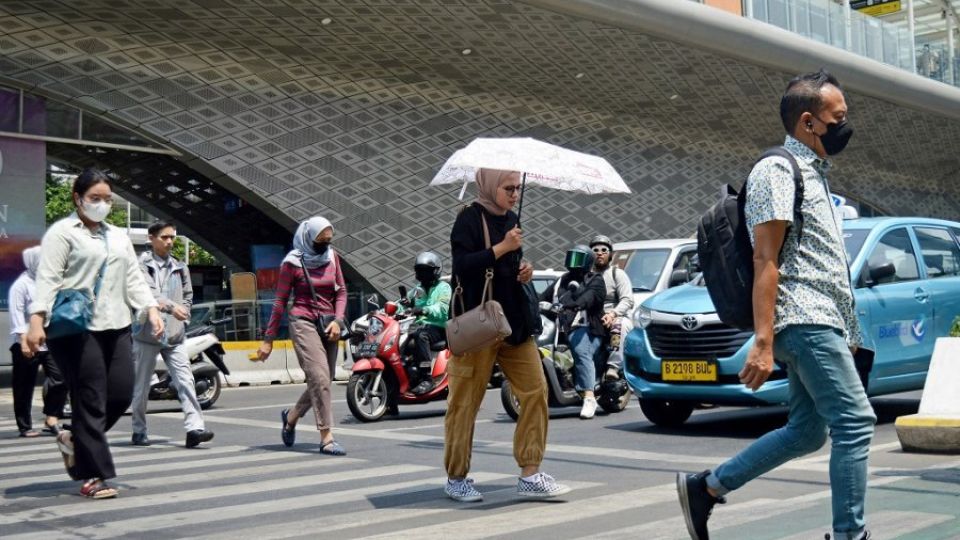Home to over 10 million residents, Jakarta has been grappling with deteriorating air quality, which is mainly caused by the transportation sector
JAKARTA, Indonesia (ANN/THE JAKARTA POST) – The recently concluded two-month experiment of remote working for public employees in Jakarta failed to significantly alleviate the city’s severe traffic congestion and air pollution, according to analysts.
The policy, which mandated that civil servants working for the Jakarta administration adopt a work-from-home (WFH) approach from August 21 to October 21, aimed to combat the city’s persistent air pollution crisis. Exceptions were made for essential sectors such as education and healthcare. In response to the policy’s limited impact, Jakarta’s acting governor, Heru Budi Hartono, has now ordered public employees to return to their offices.
The WFH initiative was initiated due to the city’s acute air pollution, which dominated Swiss company IQAir’s pollution ranking for nearly a week in August. The hope was also to alleviate potential traffic congestion issues that might have disrupted the 43rd ASEAN Summit scheduled for early September.

Syafrin Liputo, head of the Jakarta Transportation Agency, reported a modest reduction of approximately 40,000 vehicles in the city’s daily traffic volume during the policy’s implementation, decreasing from 6.84 million vehicles to 6.8 million vehicles, representing a reduction of about 0.63 percent. Additionally, weekday morning and evening rush hour traffic experienced minor declines of 1.48 per cent and 0.46 per cent, respectively.
The results of this experiment will serve as valuable data for the Jakarta administration to formulate strategies for addressing air pollution, as stated by Heru in a recent announcement.
Sporadic policy
Jakarta, home to over 10 million residents, has been grappling with deteriorating air quality, which is mainly caused by the transportation sector followed by industrial activities, according to official data.
Among the efforts made by the Jakarta administration, and the central government, to reduce the pollution levels, the WFH policy was considered “reactive” and not backed by a strong academic review, said Indonesia Transport Society’s (MTI) Jakarta branch head Yusa Permana.
Jakarta’s air quality has hardly improved. Jakarta scored 177 in late August, or “unhealthy”, for the air quality index (AQI) based on measurements from IQAir. IQAir recorded an air quality index of 161 in Jakarta in mid-September, placing it also in the unhealthy category.
The AQI improved to 133 on Oct. 15, although still “unhealthy for sensitive groups such as children, the elderly and pregnant women”, according to IQAir. The index bounced back to the unhealthy category at above 150 for several consecutive days before the remote working policy ended on October 21, or about the same level as on August 14, when President Joko “Jokowi” Widodo held a limited cabinet meeting on tackling Jakarta pollution.
“Although [the pollution level] had declined temporarily, we do not know whether it was caused by the WFH scheme, the administration’s instruction for people to reduce mobility during the summit, or any other policy,” Yusa told The Jakarta Post.
While waiting for more complete data, Yusa suspected that the two-month WFH policy did not significantly reduce the pollution, since the number of public employees was not comparable with workers from the Greater Jakarta area who kept commuting into the city.
Jakarta Environment Agency head Asep Kuswanto said that the Jakarta administration employees were outnumbered by civil servants working in central government ministries and private employees who were not subject to the policy, making it ineffective, as quoted by Kompas.com.
Public policy expert Agus Pambagio said the government should have listed which workers were subject to remote working. “The policy would have been more effective in reducing pollution and traffic density if it was imposed on city employees regularly using private vehicles instead of public transportation,” he told the Post.
Besides implementing remote working, the authorities had also enforced stricter regulations on private vehicles, which they recognised as a major transportation problem in the city, by imposing fines for motorcycles and cars that could not pass emissions tests started in early September. This program, however, was terminated after only 11 days of being put in place.
Yusa said that the city could not depend on one solution alone to tackle air pollution, stressing the urgency for “a comprehensive policy around cutting down the number of private vehicles and improving public transportation”.


